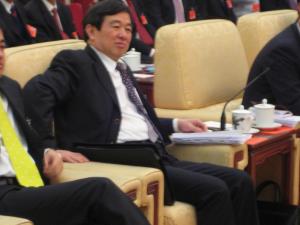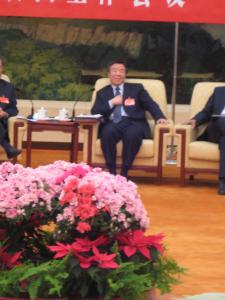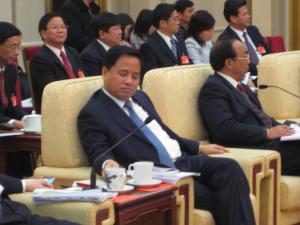Jonathan Ansfield’s most recent Biganzi dispatch:
So great is the Great Hall of the People that there’s always room for a sideshow, even when the national legislature is in session.
Last Friday at 8:50 a.m., a pack of frumpy middle-aged women clambered up the steps toting plastic bags. Any place else they might be pegged for petitioners. Turned out they were support staff for the Chinese modeling agency New Silk Road (新丝路), there for a rehearsal of an annual “Women’s Day” ceremony. “We’re in the show,” boasted one of the older crowd, evidently referring to their younger charges. Soon the jingle-jangle of a made-for-CCTV gala beckoned from the theater above, rebounding through the desolate foyer below. Access was restricted, however; lads in black suits were posted at every elevator and staircase, blocking passage to the second floor. Wu Yi, the models and 1,000 other women from around the world were well-guarded.
Down on the main level the Fujian province delegation was open to the press, and somewhat revealing in its own right. Those reporters who weren’t chasing the upcoming Taiwan presidential elections were checking in on the unbuilt Taiwanese-owned petrochemical project popularly dubbed ‘Xiamen PX’. The name’s fast becoming a misnomer, of course. Since at least December, when citizens balked over an environmental impact assessment of the project’s original ‘hood, Xiamen and Fujian leaders have pushed to jettison the plant from Xiamen down the shore to Gulei peninsula, in the city of Zhangzhou, a strip of fishing villages far less populous and developed. But company bosses along with central government planners administering the project have yet to commit to such a move, which would require a new round of approvals and feasibility studies, construction of new port, power and water facilities, and likely a financial package of fresh concessions and compensation. Any potential move was further complicated by protests the previous weekend one county over from the proposed site, which spiraled into bloody clashes with police.
News of the move Fujian leaders floated in December was first leaked in the Ta Kung Pao, immediately refuted in the Wen Wei Po, only to be picked up in Southern Weekend. It then permeated indirectly in progressive media paeans to Xiameners’ coup. But this was the first time key Fujian figures involved faced the press over it since that time.
Reuters coverage captures the gist of their comments. Interestingly, Xinhua and other Chinese outlets put a rather populist and placatory spin on their comments, in contrast to the shifty, patronizing tone one might have gleaned from the whole exchange, excerpts of which are roughly translated below.
Fujian officials have been caught in a bind: between, on the one hand, continued external pressures to allay public fears and, on the other, sources contend, internal criticism for bungling the blowback there and helping spur a rash of protests over other projects elsewhere. As such they hedged conservatively. They sounded shifty and abrasive. They made it seem only natural and self-evident that while the project was sound, its present location in Xiamen no longer was. They soft-pedaled on the media and popular dissent that forced them to adopt that posture and skipped entirely over the misguided planning in the area that played into the controversy to start. And most ominously, they defended the Gulei site in practically the same passive-aggressive manner they once had Xiamen.
It was right here in Beijing one year ago that the whole to-do over the petrochemical project first caught the glare of Chinese press, when the Taiwan-born Xiamen U. biochemist and CCPPC delegate Zhao Yufen filed an incendiary proposal to uproot the project. Zhao did not land a new term this year.
The PX affair did come up in conversation among the Fujian NPCers last week, according to one Fuzhou-based journalist tagging along with the delegation. But it was not an agenda item, he explained, since there was nothing conclusive to discuss. “It’s leaving Xiamen is for sure, but whether it’s going to Zhangzhou [city] has not been resolved.”
Journalists at the session had the tea to thank for the first trickle of official comment. Among those to succomb to urinary pressures was the mayor of Zhangzhou, Li Jianguo (pictured below). After he relieved himself he was cornered with ease, and quizzed about the protests in his jurisdiction:
“Because right now this PX project is rather sensitive, so we have not said it’s going to land in Zhangzhou. There’s only this intention, an intention is all.
“Now, about this project… It’s a good project. The project itself does not have any problems. That’s the first point. The second point is that for it to come to Zhangzhou, Zhangzhou should be able to accommodate it, because the conditions and environment are all okay, so that if you’re talking about a petrochemical project on Gulei peninsula, it should be acceptable. If it’s not PX, then other petrochemical projects could be accommodated as well.”
 Li Jianguo
Li Jianguo
This correspondent asked him how the protests across the water on Dongshan Island would affect the recommended move.
“The main problem is, because the masses basically do not get what PX is, and are unclear about it, and we’ve had relatively little contact with this sort of thing, so correct guidance is needed on these moves. Because if you look overseas, there are a lot of PX [plants]. Like in Singapore, there is only a little over 600 metres between the plant equipment and [city areas].”
Li was soon rescued from the scrum by a publicity flak.
Later, during the official Q&A, this correspondent asked Fujian Party Secretary Lu Zhangong for an update on the state of the project. He let Xiamen mayor Liu Cigui (pictured below) have the first crack.
 Lu Zhangong
Lu Zhangong
 Liu Cigui
Liu Cigui
Liu turned straight to this correspondent. “Have you been to Xiamen?” he asked sharply. (I told him I had.) Liu had been among the more conciliatory official voices as opposition toward the project swelled in May, which is not necessarily saying much. Clearly he had settled back into bureaucrat mode. Liu gave a long-winded sketch of Xiamen’s transformation the past three decades on the back of double-digit growth patterns.
“So Xiamen’s positioning [today] is as a modernized, scenic, tourist port city. This PX project that you just mentioned is a petrochemical project. It should be said that this is a good project – that is for sure. [But] because the period from the time efforts to win the project were initiated to the time construction began was relatively long, we’ve been required to give added consideration to speed and quality as Xiamen developed, and to Xiamen’s function and positioning.”
Space was constricted in Xiamen, noted Liu, because half the land is mountainous and another part national preserve. Tourism and ports were bustling as well. Hence Xiamen was become more of a financial, R&D, logistics and convention center, and the district of Haicang, originally zoned for petrochemicals, had to cater to the development of high-end service industry. He made but passing mention of the environmental re-assessment from an official academy in Beijing.
“Because of this, we’ve recommended this project — because after all it is just a project, right? So the media have hyped this a good deal. Because Xiamen is a sensitive area, so perhaps for a beautiful city like Xiamen the degree of attention everybody pays is relatively high. Naturally it should not have gotten to this extent. Because I’ve come across a lot of media and they all want to ask me about it. So I feel that the degree of attention on Xiamen, as a beautiful city, is relatively high. And we do thank the the media, too — so at the moment…the city government holds that this project, this good project, can go some place in Fujian province that is more suitable, more spacious. Because [in the original location] it has only a scale of 800,000 tonnes [in yearly output] and cannot possibly develop further. So there’s no room for even the project itself to extend and broaden its line. Therefore, in order to build the petrochemical industry stronger and bigger, because the petrochemical industry is still very much in need on the western coast [of the South China Sea] and across our country, we recommend this project not be built in Haicang but somewhere else in the province with more space. So right now we’re negotiating with the owners, and in accordance with procedures, reporting to higher authorities. I think we’re heading in a satisfactory direction to develop. Thank you.”
The aloof account from Liu seemed to amuse Lu, who sniggered. “Heh, heh…This matter was very simple to start with. But then they messed back and forth with it and made it very complicated.”
Who Lu meant by “they” was unclear.
Liu sniggered back. “It was just a project, naturally.”
Now it was Lu’s turn. He was careful to bring up to date what had gone wrong without delving into specifics or assigning blame. He maintained there had been geographical “confusion” (in the media, presumably) between the main island of Xiamen and the greater city area where the plant was to be located. After Xiamen became a Special Economic Zone in the early 1980’s, he noted, Haicang peninsula was formally zoned for Taiwanese investment and petrochemical development (officially in 1990-91, when the intended beneficiary was Formosa Plastics).
“But for various reasons, it never became a significant petrochemical zone.”
Over the years, Lu went on, Xiamen’s “situation changed”. It emerged a shipping and high-tech center, and the application process for the PX project dragged on during this time, Lu said. He did not point out that during this five year lag from 2001 to 2006, the local government rezoned Haicang a second city center to accommodate a commercial real estate boom and approved two dozen property projects within two miles of the proposed plant site. He only reiterated the fact that at this point there was little space to spare.
“For example, this project could be placed there. But to turn this project into a petrochemical district, a petrochemical base, would be difficult. There’s no leftover land to develop further. So Xiamen people were correct to have complaints. At the time, then, the Xiamen people had complaints. That had to do with Xiamen’s function and positioning.”
Lu ran down the tick-tock of how the local government had suspended the project and ordered an independent environmental survey, but did not specifically mention popular protests. He reiterated that there was nothing wrong with the project itself and again cited the example of Singapore. But he came back to the changes in Xiamen.
“So as it happened, based on the relevant objections of the people, and with this shift, whereby Xiamen settled upon adjusting its function, it raised this recommendation [to relocate the PX factory on Gulei peninsula] – right now it can only be said that it’s a recommendation, and nothing else has been carried out – Fujian province wishes to agree with Xiamen’s opinion, because this place Xiamen is too small.”
His point was that the most recent protests flared prematurely.
“Before the move is set, first the national government must agree to you relocating. Two, the company’s choice must be respected. If it chooses Fujian, fine, but it could choose not to be in Fujian. It might want to go somewhere else…Right now we have no idea about any these things, but there are some people [fighting the move] with all they’ve got. So now there basically aren’t any clear problems, but because of various factors, some of the masses are still reacting with accusations. The place where they’re reacting in Zhangzhou, Dongshan — hah, hah — this has even less to do with Dongshan.”
For an instant he was choked up in awkwardly jittery laughter.
“…Now it’s already being dealt with appropriately.”
Lu called on the Zhangzhou mayor, Li Jianguo. Li asserted Zhangzhou’s capability to build a port to support the petrochemical trade on Gulei peninsula:
“My meaning is, if there were a good project like this that could be situated on Gulei peninsula, we would very much welcome it, and could undertake it. Right now, we have this intention, but because this intention has not entered into something substantive, it’s only an intention. But if this intention is for real, we also would very much welcome it.”
Added Li:
“But most recently, there are certain individuals, whether over the Internet or through other means, individual people who are not very welcoming. What’s the main problem here? There’s a kind of misunderstanding. Where’s the misunderstanding? The misunderstanding is that if [the project] moves to Zhangzhou it will have such and such an impact — there’s this misunderstanding here. In addition, there’s a misunderstanding of this project. Is this project alright or not? In truth this project is very good.”
Again he returned to the example of a major petrochemical base in Singapore. “At its nearest it’s only 650 meters away from the metropolitan area. Everywhere in the world has [such sites]….”
Lu cut in. “And America.”
Li: “Right.”
Lu: “That petrochemical base in America, its scale is much bigger still.”
Li: “That petrochemical base in America, what’s that place called? How big is the scale of the refinery? 100 million tonnes [a year], and it’s also very close to the metropolitan area.”
Lu chimed back: “This is just a misunderstanding. Right now the people, their environmental awareness is getting stronger and stronger. This should be fully endorsed. This is a goal of ours, too.”
Li turned to a reporter from Hong Kong’s Singtao Daily. “Just now one of our journalists here, when I stepped out, he asked me something. I want to correct you once more. This journalist here asked me question, saying, ‘Xiamen did not want this PX project.’ I want to correct that. You can’t say Xiamen did not want it. As I just was saying, and Mayor Liu was saying too: This is a good project. Everybody was fighting to win it.”
The chamber fell silent for a few seconds before Lu prompted the next question.






